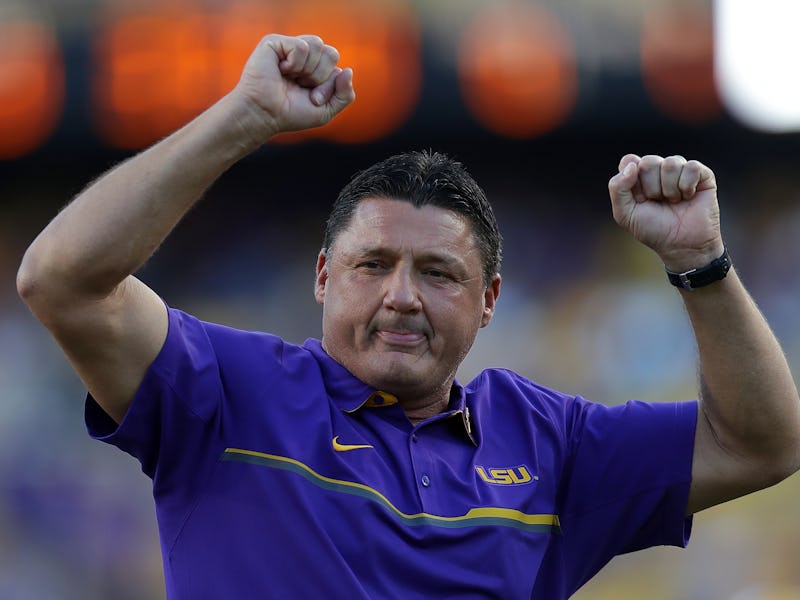Science Explains Why 8 Monster Energy Drinks Won't Kill LSU Coach

The unintelligibility of Louisiana State University football coach Ed Orgeron’s speeches is usually just chalked up to his fiery passion for the game. For a long time, fans and curious witnesses of the 55-year-old ball of fury thought he just loved football so fervently he had no energy left to spare for enunciation. But on Wednesday he revealed one secret to his terrifying vigor: Monster energy drinks. Lots of them.
In an interview on ESPN’s Dan Le Batard podcast, Orgeron admitted that some days call for an excess of energy drinks. When Le Batard asked him how many Monster energy drinks he consumed daily, Orgeron said he can consume eight to ten cans a day. “If we’re gonna do something here at LSU,” he said to Le Batard, “we do it full speed, my man.”
The amount of caffeine contained in eight to ten Monsters is enormous. A single can of Monster contains about 240 mg of caffeine — roughly equivalent to 2.5 eight-ounce coffees (which contain 90 mg of caffeine each) or seven regular cans of Coca-Cola (about 32 mg each). So, the amount of caffeine Orgeron gets in ten cans of Monster is roughly the same as what he’d get after crushing 70 cans of Coke or 25 cups of coffee — that is, 2.4 grams.
It’s probably not going to kill him, though. While scientists have struggled to settle on a definitive limit to fatal caffeine intake — it’s dependent on a lot of other factors, especially body mass — a few have offered up some numbers for guidance. The editor of the Journal for Caffeine Research, Jack James, Ph.D., told Popular Science in 2012 that an adult would need about 10 grams of caffeine to overdose — that’s five times the amount Orgeron consumes on a “full speed” day. The only other concrete number in the literature comes from a 2005 study in Forensic Science International, which put the upper limit for adult humans at 5 milligrams, which is still twice what Orgeron takes.
Still, deaths have been blamed on energy drinks in the past. In fact, in 2012, a lawyer representing the family of a 14-year-old who had died from Monster drinks revealed to the court that the FDA had actually linked them to five other deaths in the years prior. But in these cases, it’s rarely the effect of excessive caffeine alone that is fatal; what’s dangerous is the effect of a lot of caffeine combined with other substances or existing medical conditions, especially those that have to do with the cardiovascular system. If you’ve already got heart arrhythmia problems, you can probably bet that a lot of caffeine will fuck up your pulse even more!
Of course, the caffeine combination that researchers know the most about is the pairing of energy drinks and alcohol, which is so popular that harm reduction scientists have taken note. Since Orgeron admits to maximal Monster intake when he is drinking, he may want to take note of what the literature says: Not only has the cocktail of booze and energy drinks been linked to extremely bad decision making; a dangerous, cocaine-like high; and, sometimes, a very silly placebo effect — it’s also been linked to death, because people who are extra-caffeinated can’t always tell when they’re dangerously drunk.
Orgeron has since clarified that drinking eight to ten Monsters in a day is not an event that happens regularly, but he did reiterate that when it does happen, it happens when he is drinking. Booze-related effects aside, he should probably take heed of the other symptoms of over-caffeination, which include fever-like sensations, hallucinations, convulsions, an inconsistent heartbeat, and in really bad cases, psychosis.